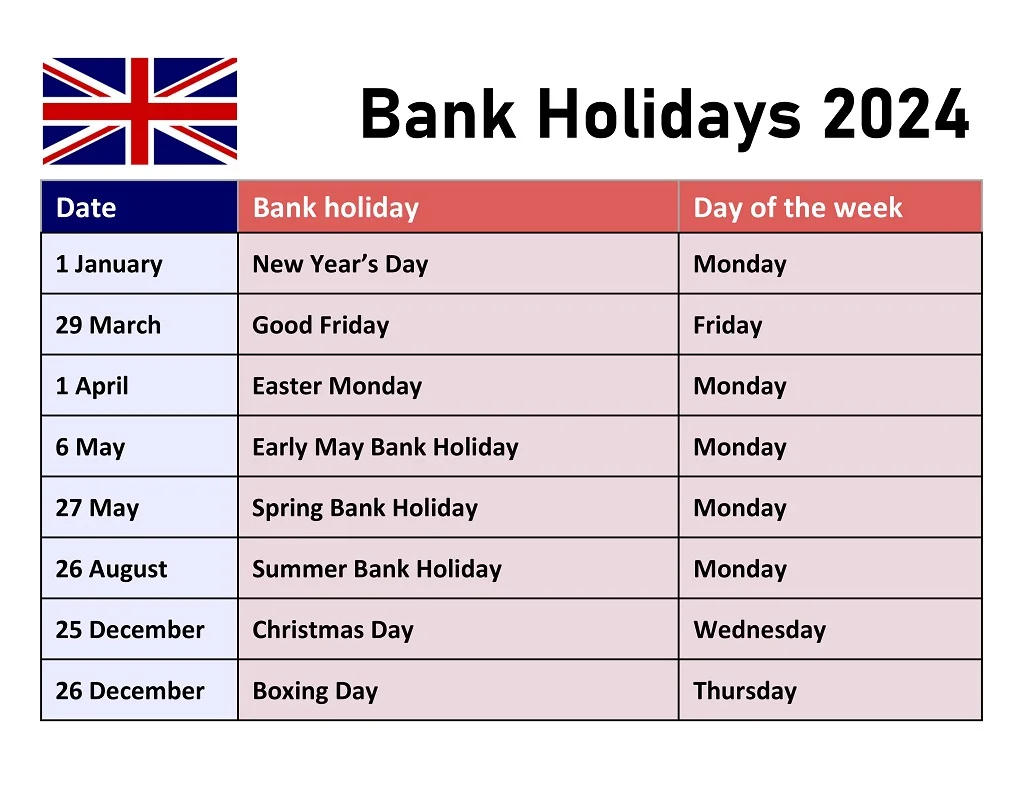Are you curious about the upcoming UK bank holidays for 2024? As the new year begins, you must know when the public holidays are so you can plan your vacations, events, and family gatherings. UK bank holidays affect everyone, whether you’re a student, a worker, or a business owner.
UK bank holidays, or public holidays, are government-recognized days off work. These holidays mark significant events, such as religious celebrations, historical events, and national observances. They are important for many reasons, such as giving workers a break, promoting cultural awareness, and boosting the economy through tourism.
So, what are the UK bank holiday dates for 2024? This year, there will be eight public holidays, including New Year’s Day, Good Friday, Easter Monday, May Day, Spring Bank Holiday, Summer Bank Holiday, Christmas Day, and Boxing Day. Each holiday has its significance and traditions; I’ll share them in more detail in the following sections. By the end of this blog post, you’ll clearly understand the UK bank holidays for 2024 and how they can impact your life.
When Were Bank Holidays Introduced in the UK?
The first bank holiday in the UK was declared by Royal Proclamation in 1871. It was designated as a day of rest for bank employees. The holiday was initially only observed in England, Wales, and Northern Ireland. Scotland did not adopt the holiday until 1971.
August bank holiday was added to the calendar in 1875. The holiday was initially intended to give bank employees a day off to participate in cricket matches. The holiday was moved to the last Monday in August 1971 as part of the Banking and Financial Dealings Act.
Why Is It Called a Bank Holiday?
The term “bank holiday” was used because banks were the only institutions legally required to close these days. However, over time, the concept of bank holidays has expanded to include many other businesses and organizations. Today, bank holidays are observed by schools, government offices, and many private companies.
It’s important to note that bank holidays are different from public holidays. While bank holidays are designated by law, public holidays are not. Public holidays are days when the government and many other organizations are closed but not necessarily defined as bank holidays.
When is the next bank holiday?
In England and Wales, residents will have to wait until Christmas Day, December 25th, which falls on a Monday, for the next bank holiday. The day after, December 26th, Tuesday, is also a holiday, celebrated as Boxing Day.
In Scotland, the last bank holiday was observed on November 30th for St Andrew’s Day, which was a Thursday.
Following the Christmas and Boxing Day holidays, there will be a significant gap before the next bank holiday arrives. Therefore, it’s advisable to plan your weekends wisely and schedule any vacation time you might need in advance.
When are the UK Bank Holidays for England and Wales in 2024?

- New Year’s Day: 1 January
- Good Friday: 19 April
- Easter Monday: 22 April
- Early May Bank Holiday: 6 May
- Spring Bank Holiday: 27 May
- Summer Bank Holiday: 26 August
- Christmas Day: 25 December
- Boxing Day: 26 December
When are the UK Bank Holidays for England and Wales in 2025?
- New Year’s Day: 1 January
- Good Friday: 18 April
- Easter Monday: 21 April
- Early May Bank Holiday: 5 May
- Spring Bank Holiday: 26 May
- Summer Bank Holiday: 25 August
- Christmas Day: 25 December
- Boxing Day: 26 December
When are the UK Bank Holidays for England and Wales in 2026?
- New Year’s Day: 1 January
- Good Friday: 3 April
- Easter Monday: 6 April
- Early May Bank Holiday: 4 May
- Spring Bank Holiday: 25 May
- Summer Bank Holiday: 31 August
- Christmas Day: 25 December
- Boxing Day: 28 December
What about Scotland and Northern Ireland?
When are the UK Bank Holidays for Scotland in 2024?
- New Year’s Day: 1 January
- 2nd January: 2 January
- Good Friday: 19 April
- Early May Bank Holiday: 6 May
- Spring Bank Holiday: 27 May
- Summer Bank Holiday: 5 August
- St Andrew’s Day: 30 November
- Christmas Day: 25 December
- Boxing Day: 26 December
When are the UK Bank Holidays for Scotland in 2025?
- New Year’s Day: 1 January
- 2nd January: 2 January
- Good Friday: 18 April
- Early May Bank Holiday: 5 May
- Spring Bank Holiday: 26 May
- Summer Bank Holiday: 4 August
- St Andrew’s Day: 1 December
- Christmas Day: 25 December
- Boxing Day: 26 December
When are the UK Bank Holidays for Scotland in 2026?
- New Year’s Day: 1 January
- 2nd January: 2 January
- Good Friday: 3 April
- Early May Bank Holiday: 4 May
- Spring Bank Holiday: 25 May
- Summer Bank Holiday: 3 August
- St Andrew’s Day: 30 November
- Christmas Day: 25 December
- Boxing Day: 28 December
When are the UK Bank Holidays for Northern Ireland in 2024?
- New Year’s Day: 1 January
- St Patrick’s Day: 17 March
- Good Friday: 19 April
- Easter Monday: 22 April
- Early May Bank Holiday: 6 May
- Spring Bank Holiday: 27 May
- Battle of the Boyne: 12 July
- Summer Bank Holiday: 26 August
- Christmas Day: 25 December
- Boxing Day: 26 December
When are the UK Bank Holidays for Northern Ireland in 2025?
- New Year’s Day: 1 January
- St Patrick’s Day: 17 March
- Good Friday: 18 April
- Easter Monday: 21 April
- Early May Bank Holiday: 5 May
- Spring Bank Holiday: 26 May
- Battle of the Boyne: 14 July
- Summer Bank Holiday: 25 August
- Christmas Day: 25 December
- Boxing Day: 26 December
When are the UK Bank Holidays for Northern Ireland in 2026?
- New Year’s Day: 1 January
- St Patrick’s Day: 17 March
- Good Friday: 3 April
- Easter Monday: 6 April
- Early May Bank Holiday: 4 May
- Spring Bank Holiday: 25 May
- Battle of the Boyne: 13 July
- Summer Bank Holiday: 31 August
- Christmas Day: 25 December
- Boxing Day: 28 December
Scheduling and Observance
UK Bank Holidays are days when banks and many other businesses are closed for business. They are also public holidays, meaning people get the day off work. Three types of Bank Holidays exist in the UK: Fixed Dates, Variable Dates, and Substitute Days.
Fixed Dates
Fixed Dates are Bank Holidays that fall on the same date every year. There are four Fixed Date Bank Holidays in the UK: New Year’s Day on January 1st, Good Friday, Christmas Day on December 25th, and Boxing Day on December 26th. If any of these holidays fall on a weekend, the following Monday is observed as a Bank Holiday.
Variable Dates
Variable Dates are Bank Holidays that fall on different dates each year. There are two Variable Date Bank Holidays in the UK: Easter Monday and the Spring Bank Holiday, which falls on the last Monday in May. The dates for these holidays change every year, so it’s essential to check the calendar to see when they will fall. The next bank holiday is the spring bank holiday, which falls on Monday, May 27th, 2024.
Substitute Days
Substitute Days are bank holidays observed on a day different from the actual holiday. This happens when a Bank Holiday falls on a weekend, and the following Monday is not already a. In this case, the following Monday is observed as a Bank Holiday instead. For example, if Christmas Day falls on a Saturday, the following Monday and Tuesday would be Bank Holidays. The same would happen if Christmas Day falls on a Sunday, with the following Tuesday and Wednesday being Bank Holidays.
During Bank Holiday weekends, public transport may operate on a reduced schedule, so checking schedules in advance is important. Banks and many other businesses will also be closed, so it’s a good idea to plan if you need to access services during this time.
How do you maximize your annual leave for 2024?
In 2024, both employees and employers in the UK will be strategizing on how to optimize annual leave. Employers, on their part, must ensure adequate staffing during holidays while efficiently tracking absences.
Key strategies include:
Advance Planning: The cornerstone of leave management is being aware of the 2024 bank holiday schedule. Early identification of these dates allows for strategic vacation planning and helps in avoiding last-minute staffing issues.
Utilizing ‘Bridge Days’: A concept popular in several European countries, ‘bridge days’ involve aligning annual leave with adjacent bank holidays to extend time off without significantly dipping into allocated leave days. This approach can effectively add an extra day to the holiday period.
Employers have a unique opportunity to guide their teams on making the most of bank holidays. Educating employees on planning their leave around these days not only promotes well-being but also encourages them to disconnect and recharge, contributing to a healthier work-life balance.
Planning for UK Bank Holidays
When planning for UK bank holidays, consider the following strategies and tips to make the most of these days off:
Check the Dates Early: Bank holiday dates can be found on official government websites, like GOV.UK, or through local council websites. Knowing the dates well in advance can help you plan holidays, events, or rest days more effectively.
Understand Regional Variations: Bank holidays can vary across the UK’s four countries—England, Wales, Scotland, and Northern Ireland. Make sure to check the specific dates for your region, as Scotland and Northern Ireland have additional bank holidays compared to England and Wales.
Plan for Travel: Bank holidays are popular times for short trips within the UK or for vacations abroad. Booking your travel and accommodation early can save money and avoid the rush, as prices often increase closer to the date.
Consider the Weather: For outdoor activities or travel plans, consider the UK’s seasonal weather patterns. Spring and summer bank holidays (e.g., Easter Monday, the last Monday in May) might offer better weather for outdoor events compared to early May or late August holidays.
Local Events and Attractions: Many towns and cities host special events over bank holiday weekends, such as festivals, markets, and parades. Check local event calendars for things to do.
Retail and Service Hours: Be aware that shopping centers, supermarkets, public services, and transport systems may operate on reduced hours during bank holidays. Plan any necessary shopping or travel arrangements.
Day Off In Lieu: If you are required to work on a bank holiday, check your employment contract for entitlements such as extra pay or a day off in lieu. Knowing your rights can help you negotiate with your employer.
Book Activities in Advance: If you’re planning to visit attractions, dine out, or attend events, remember that bank holidays are busy times for such activities. Booking tables, tickets, or entry times in advance is wise to ensure availability.
Consider a Staycation: With everyone rushing to get away, sometimes the best retreat is a staycation. Explore local attractions, parks, and museums, many of which may have special bank holiday programming.
Balance Rest and Activity: While it’s tempting to pack your bank holiday with activities, remember these days are also a chance to rest and recharge. Consider setting aside time for relaxation at home or in nature.
Which bank holidays are changing this year?
In 2023, since New Year’s Day landed on a Sunday, the associated bank holiday was moved to the following day, Monday, January 2nd.
Good Friday, which occurred on April 15th in 2022, took place earlier in the year in 2023, on April 7th, marking its return to the first week of April.
Additionally, the UK celebrated a special bank holiday on May 8th in honor of King Charles III’s coronation, adding an extra day off to the calendar for that year.
Why do we have bank holidays?
The tradition of bank holidays in the UK dates back to 1871, initially observed by banks and financial entities as official days off. Over time, this practice expanded beyond the financial sector, with businesses, educational institutions, and government entities also embracing these holidays. Today, bank holidays are a nationwide observance.
However, not everyone gets to take the day off; key workers, as well as employees in sectors like retail, hospitality, and media, may still need to work on these days. For those who do work on a bank holiday, it’s common to receive a compensatory day off, ensuring they don’t miss out on the benefit.
Frequently Asked Questions (FAQs)
Why are bank holidays in the UK so named?
Bank holidays in the UK are so named because they were initially days when banks were closed for trading. These days were declared public holidays so people could take a break from work and spend time with their families.
How many bank holidays are there in the UK in 2024?
There are eight bank holidays in the UK in 2024. These include New Year’s Day, Good Friday, Easter Monday, Early May Bank Holiday, Spring Bank Holiday, Summer Bank Holiday, Christmas Day, and Boxing Day.
What is the difference between a bank holiday and a public holiday in the UK?
In the UK, bank holidays and public holidays are often used interchangeably. However, technically speaking, a bank holiday is a day when banks are closed, whereas a public holiday is when the general public is given a day off.
When is the Summer Bank Holiday in 2024?
The Summer Bank Holiday in 2024 falls on Monday, August 26th.
What date is the May Bank Holiday in 2024?
The May Bank Holiday in 2024 falls on Monday, May 6th.
Are there always eight bank holidays in the UK?
There are only sometimes eight bank holidays in the UK. The number of bank holidays can vary yearly depending on the calendar and the government’s decisions.
How many UK bank holidays are there in a year?
There are typically eight UK bank holidays in a year. However, as mentioned earlier, the number of bank holidays can vary yearly.
Conclusion
UK Bank Holidays are an essential part of the British culture and economy. They provide a much-needed break from work and allow people to spend time with their families and friends. As we have seen, there are eight bank holidays in the UK, and their dates vary each year. Planning your work schedule and holidays is crucial to make the most of these days off.
Remember that bank holidays can affect your business, so it is essential to stay up-to-date with the latest information and plan accordingly. This article has provided valuable insights into UK Bank Holidays and their significance.
Please share this article with your colleagues and friends if you found it helpful. Thank you for reading!













![25 Best Peruvian Foods You Must Try In Peru [With Recipes] Peruvian Food](https://tourinplanet.com/wp-content/uploads/2024/07/Peruvian-Food-100x75.jpg)












![What is The Marvelous VFR C500? – [Key Features and Overview] Marvelous VFR c500](https://tourinplanet.com/wp-content/uploads/2024/07/Marvelous-VFR-c500-100x75.jpg)

